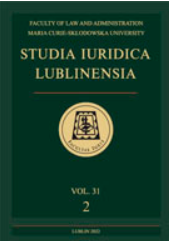The Meaning of the Likelihood of Severe Penalty Being Imposed upon the Accused in Making a Decision on Pre-trial Detention
The Meaning of the Likelihood of Severe Penalty Being Imposed upon the Accused in Making a Decision on Pre-trial Detention
Author(s): Szymon TarapataSubject(s): Social Sciences, Law, Constitution, Jurisprudence, Criminal Law, Sociology, Criminology
Published by: Wydawnictwo Naukowe Uniwersytetu Marii Curie-Sklodowskiej
Keywords: pre-trial detention; severe penalty; coercive measures; Code of Criminal Procedure
Summary/Abstract: This article is of a scientific nature, that employs a dogmatic method. The aim of the study is to establish the status and function of the severity of penalty under Article 258 § 2 of the Code of Criminal Procedure (hereinafter: the CCP) in making decisions on the application of pre-trial detention. This issue is controversial both in doctrine and jurisprudence. The text presents a new approach that Article 258 § 2 of the CCP does not set out a specific premise for the imposition of pre-trial detention. This provision cannot express an independent criterion for imposing the most severe preventive measure as Article 258 § 2 of the CCP is of auxiliary character. It expresses an auxiliary criterion for determining whether the special premises for imposing pre-trial detention under Article 258 § 2 of the CCP have been realized. The proposals contained in the article are intended to facilitate the interpretation of national provisions on coercive measures and to facilitate their application in the practice of the judiciary. The article indicates the factors that are important in assessing whether the likelihood of imposing severe punishment crystalizes the risk of fleeing, hiding or obstructing justice. For the application of pre-trial detention there may be arguments, i.a., pertaining to the nature of the offense alleged. In this context, it should be important whether the potential perpetrator is charged with a crime with a use of violence or threat thereof. His posture in the course of criminal proceedings so far is also not without significance. It may be, however, that the likelihood of imposing severe penalty may give rise to the fear of obstruction of justice even in a situation where the accused, who knew about the pending criminal case, did not take any unlawful action. Nevertheless, the correct posture of the accused in the course of criminal proceedings will often be a significant factor against the use of pre-trial detention.
Journal: Studia Iuridica Lublinensia
- Issue Year: 31/2022
- Issue No: 3
- Page Range: 233-254
- Page Count: 22
- Language: English

